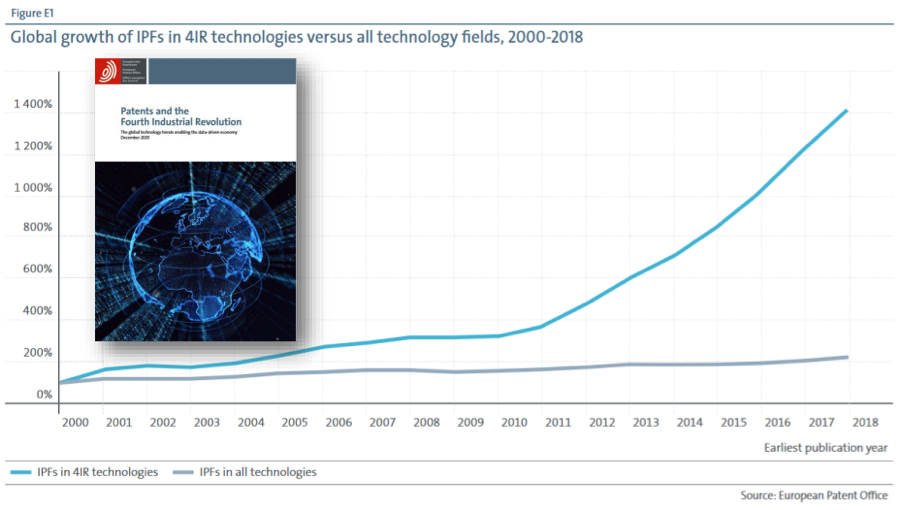IP management within the digital transformation: Case Study Project at the Center for International IP Studies (CEIPI / Strasbourg University)
The latest data from the European Patent Office (EPO) on patent activities within the fourth industrial revolution (4IR) shows the dramatic development with a global growth in IPFs of 1,400% since the year 2000 and a growth of 54% in the last three years alone at the EPO as well as in the other IP5 intellectual property offices (USPTO – US Patent and Trademark Office; JPO – Japan Patent Office; KIPO – Korean Intellectual Property Office and CNIPA – National Intellectual Property Administration). This development shows opportunities as well as the risks that lie in the changed role of IP due to the digital transformation of the economy and society. Here, you get access to the study (12/2020): Patents and the Fourth Industrial Revolution

Here you can find the interview with the Chief Economist of the European Patent Office Yann Ménière on the current development of patent activities in the Fourth Industrial Revolution:
 The case studies come directly from the university education programs in IP-Management at CEIPI. The CEIPI offers various courses such as the Master of Intellectual Property Law and Management (MIPLM), the University Diploma in IP Business Administration (IPBA) as well as the various certificate courses. The presented topic is taught in the University Certificate Course on IP in the Industry 4.0.
The case studies come directly from the university education programs in IP-Management at CEIPI. The CEIPI offers various courses such as the Master of Intellectual Property Law and Management (MIPLM), the University Diploma in IP Business Administration (IPBA) as well as the various certificate courses. The presented topic is taught in the University Certificate Course on IP in the Industry 4.0.
The case study project is accompanied by the industrial council competition for the Rudolf Diesel Medal, the oldest general innovation award in Germany, and carried out by doctoral students at the graduate school under the supervision of the mentoring program of experienced heads of patent and IP departments. The case studies describe the status of the implementation of DIN77006 / ISO56005 in IP management and show how successes in digital transformation are already closely linked to modern IP management and illustrate how companies are also in international competition with, for example, the USA and China well prepared.
The aim of this initiative is to describe best practice examples in case studies, which should be available both for teaching and for marketing of the companies (and their IP work). As support and in return for their commitment, participants have access to extensive online teaching materials from the IP Business Academy, a project by CEIPI and the EPA for training in IP management. The preparation of the case studies is supported by funds from the European Commission.



